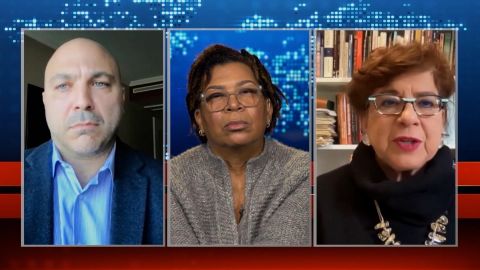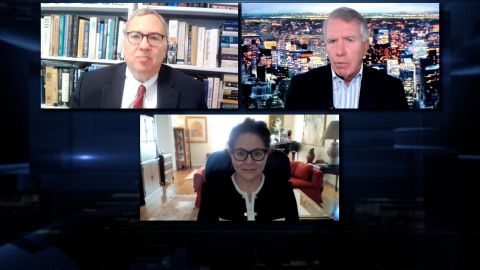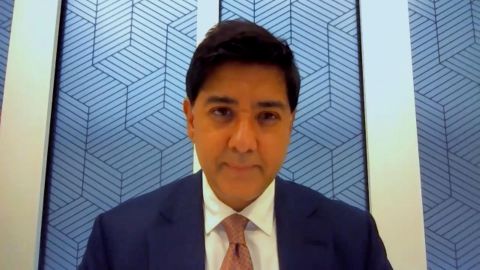>> Good evening and welcome to MetroFocus.
I am Jenna Flanagan.
In just the latest incident of anti-Semitism on a college campus, a 21-year-old Cornell student was arrested for threatening to kill Jewish classmates, shoot up a kosher dining hall and slit the throat of any Jewish man he came across.
Governor Hochul as directed state police to increase security at colleges and universities across New York, but many Jewish students still feel their schools are not doing enough to protect them.
A group of Jewish students from elite schools like Cornell and Harvard are now planning to sue their universities, accusing them of turning a blind eye to the growing hatred.
Since the Israel-Hamas war began, there have been many reports on college campuses here in New York and across the country of violent threats, intimidation tactics, public doxxing, and assaults.
Student supporters of both Israel and Palestine have expressed fear for their safety in recent weeks, and joining us now with much more on the increased violence and fear that we are seeing on college campuses is Melissa corn, a reporter covering the story for the Wall Street Journal, and she joins us as part of our exploring hate initiative, examining the intersection of anti-Semitism, racism, and extremism in America.
Melissa, welcome to MetroFocus.
>> Thanks for having me.
>> I want to start with that story at the top about the student at Cornell University was been arrested.
Can you tell us what you know has happened thus far?
>> sure, over the weekend there were messages that were posted online threatening violence against Jewish students, against a kosher dining hall, and a great concern amongst students for their safety, just tell real threat — just how real this threat was.
A 21-year-old student was arrested for allegedly making these threats and causing quite a panic on campus.
Jenna: of course, and I am also wondering — excuse me, for the lawsuit two groups of students at least that we know of at elite colleges are planning to file.
Is this something that we have ever seen before?
Students suing their college campuses were not doing enough to keep them safe?
Melissa: I am not sure if there have been similar lawsuits in the past, but there is definitely a new level of concern among students, both Jewish students and Muslim students, students who are Palestinian or assumed to be Palestinian.
Students who are is really or are assumed to be is really are concerned that their schools are not protecting them enough, are not speaking up enough for them enough, and are not criticizing the other side if you will enough.
Jenna: of course, in speaking of that, college campuses have long been — I do not want to say a hotbed, but a place where there have been protests and competing ideas and debates, and that is what a lot of college campuses like to pride themselves on.
Why is this a situation where this is causing much more friction than it seems to have in the past?
Melissa: right, this is going from indicative academic discussion to something that is really fueled by emotion, often times fueled by misunderstanding , and it is people shouting at each other rather than having a conversation and learning from each other, which as you said is something that campuses pride themselves on being able to do.
Provide a forum for that, and we have seen this step up.
The thing that I find perhaps most interesting about what we are seeing at the current moment on college campuses are these rather strange bedfellows of who is coming together to stage these protests and demonstrations.
Who is speaking out saying they are in support of Palestinians, that they are against Israel, and in some cases that they are against Jewish students more broadly.
And again, there seems to be a lot of complication around what terminology they are using when they are talking about supporting or opposing a particular group of individuals around the world.
So you have God students who are active in Black Lives Matter, students who are active and LGBT groups, climate change organizations who are now front and center in some of these demonstrations on campuses supporting Palestinians and calling for the end of Israel.
Jenna: wow, OK. For some of these universities, because we have also seen the University themselves as an institution get caught in the middle, where before perhaps people were able to — especially I am thinking of university presidents, King able to walk the line of releasing a statement that perhaps condemns or acknowledges that this is a difficult issue and there are two sides, etc.
that a lot of university president seem to have an incredibly difficult time being able to walk that line of neutrality.
Is that even something that is possible anymore?
Melissa: for a number of years university presidents have been making statements about political topics, social justice issues, and they have increasingly seen it as their role.
We have a soapbox, we are going to use it.
We are a voice of reason and hopefully our statement will help set the stage or give context for what is happening in the world around us and provide some informed insight and opinion here.
The thing is, they cannot stop doing it all at once, right?
Even though this is perhaps a more divisive issue than some of the others on which they have spoken in past years, things like mass shootings, the devastation of natural disasters .
They come out with statements.
The current moment is a lot more complicated and a lot more tense, and for them to all of a sudden go quiet now in itself can send a message, that somehow this is deemed not to be worthy of their time, of their statement, of their words, but at the same time if they do make statements we have seen presidents at colleges across the country really face sharp criticism from pretty much everybody for whatever it is they do or do not say.
Jenna: we have spoken broadly about college campuses safer the incident at Cornell, so I want to speak specifically about an incident that took place in Harvard University.
As I understand it in the immediate aftermath of the October 7 attacks — it not immediately, but not too long afterwards, a group of students on campus released a statement putting the sole blame for the Hamas attack on Israel or at least the government of Israel, and that created a significant backlash, correct?
Melissa: yes, a collection of student groups wrote this letter and said that this was — what happened on October 7 was the fault of Israel’s government, full stop.
And there was great outrage on campus at Harvard that these groups were blaming Israel for a massacre against Israeli civilians, and there were immediate calls for the President, the administration of the University to step up and denounce the student groups, to say that what they were saying was inappropriate, it was wrong, was not supported by the institution.
The challenge is the institution pride itself on being a champion of free speech, even when that speech is ugly, and you saw great criticism of the University for not coming up emphatically enough, quickly enough, aggressively enough against the student statements, and there was criticism that they did not call Hamas a terrorist group quickly enough, they did not say the students were in the wrong.
This piled on very quickly, the group driving around near campus with the truck showing the names and faces of members of these organizations whose leaders signed the letter, and it later came out some of the students who were members of these organizations, they were not the one signing the letter.
The president of these groups were speaking on their behalf and that put them in a tough position.
Jenna: I am also wondering, because as we have discussed and you have laid out a clear case of this, we have a lot of emotional reaction with regard to the Ward with Israel and Hamas — war with Israel and Hamas, but college campuses are supposed to be a place of debate , so I’m wondering to your knowledge have there been any universities that have been able to use this as — and I hate to use the phrase, but a teachable moment to fully lay out and help the students fully understand the wide breadth of the history and story that led to this moment, or are people in a very emotional reaction to replace still?
Melissa: I think we are still in that emotional reaction to replace for the most part.
There are exceptions.
There are some schools and some groups that are holding teach ins, panel discussions on the history of the region, on how we got to this moment, on the creation of the state of Israel, on humanitarian efforts, on the legal definition of terrorism, things like that.
Taking a very clear academic intellectual approach to the situation, but some efforts at that have been stymied by protests, by groups saying your take on this is skewed.
This is not really an academic discussion, so let’s just shut it down entirely, but there have been some efforts at places like University of Chicago and a handful of other schools.
We are seeing faculty led efforts to have an honest, informed conversation.
Jenna: finally, speaking of the way that universities operate at what they are able to do, we have also seen that donors are playing a big part in the way universities react, do not react, statements they release and do not release.
Is that correct?
Melissa: absolutely, and that gets into presidents can seem to do no right in terms of what kind of comments they make.
You were seeing major donors, generally Jewish donors who are supportive of Israel coming out and saying to the president of their alma mater’s or schools where they have given millions, tens of millions of dollars change over not saying enough, speaking strongly enough.
I am going to stop giving you money if you do not say something soon.
I am going to end this partnership that we have because you were not supporting Israeli students enough.
I think you step down.
We are seeing this at places like Harvard, University of Pennsylvania, Stanford University.
So these are schools with well-known, powerful donor sourcing now is my moment to take a stand, and my university should be doing the same.
Jenna: Melissa, I want to thank you so much for your reporting, and we look forward to more from you.
To better understand to this very difficult and complicated issue.
Melissa: thank you.
♪



